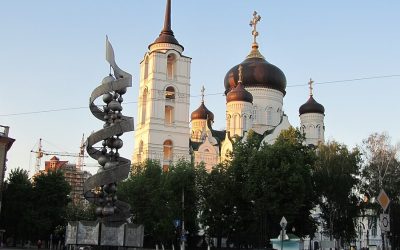How can competition with migrant scholars be turned to the benefit of Russian science?
Irina Antoshchuk
Photo: For many years, Russia has officially been striving to “build up cooperation” with Russian-speaking scientists abroad (Photo by Chris Liverani on Unsplash).
Collaboration: Pros and Cons
Collaboration with the scientific diaspora can present a valuable alternative to both “brain drain” and mass circular migration. This cooperation can compensate—albeit only in part—for donor countries’ losses due to human capital flight.
Collaboration based on common scientific interests makes it possible to use the resources of migrant scholars—expert knowledge and skills, professional contacts, and opportunities for involvement in the international research network—and thus narrow the gap in the level of scientific and technological development between countries.
At least, this is how it should work in theory.
What does cooperation with the diaspora bring in practice? How effective is it?
Scholars studying this topic urge that this policy should be critically assessed. Cooperation with the scientific diaspora has produced both winners and losers—both mobilized and excluded groups of migrants.
Moreover, one possible consequence of shifting responsibility onto highly skilled migrants is the consolidation of the existing system of global inequality.
“The Mighty Diaspora”
Russia is proud of its “mighty scientific diaspora.” For many years, the country has officially been striving to “build up cooperation” with Russian-speaking scholars abroad.
Cooperation with the scientific diaspora is “an integral component of strengthening scientific and technological potential” and serves to stimulate the development of domestic science, including by:
- increasing the quantity and quality of scientific research and innovative projects;
- internationalizing higher education; and
- increasing academic mobility.
Officials report “close cooperation” with the diaspora and its contribution to improving the ranking of Russian science.
Those Russian-speaking scientists who live abroad are also interested in cooperation. Judging by surveys and analysis of studies conducted in different fields in some scientific centers, scholars abroad keep in touch with Russian colleagues, often on a personal basis.
Unexpected Outcomes of Cooperation
My study looking at Russian-speaking computer scientists (RCS) who live in the UK began as part of the project “Russian Computer Scientists at Home and Abroad.”
I found that cooperation with colleagues in Russia can take different forms and lead to some contradictions with negative consequences for Russian science.
Cooperation Is Significant but Relations with Russia are Minimal
According to an analysis of co-authored publications, the majority of Russian-speaking computer scientists (249 people out of 298, or 83.6%) maintain contacts with other Russian-speaking scholars.
The number of Russian-speaking colleagues is on average small (median = 3) and accounts for approximately one-fourth of the total number of co-authors (median = 23.6%).
(In the event of an abnormal distribution, the data are analyzed using the median and quartiles; in this review, however, the median values are given for brevity. Sometimes the average value is also indicated, if the median is not informative enough – I.A.)
However, diaspora cooperation makes a significant contribution to the scientific activities of migrant scientists. Two-thirds of their works were co-authored with Russian-speaking scholars.
These scientists collaborate mainly with Russian-speaking colleagues in the UK (on average, two-thirds of all diaspora relations, median = 75%).
They have far fewer Russian-speaking colleagues in other countries of Europe and the US (on average 18.5%, median = 0) and even fewer in Russia (on average 15.3%, median = 0).
Thus far, this is an unusual finding.
The high level of diaspora cooperation means that scholars want to work with Russian-speaking colleagues and do so with pleasure and good results.
However, the commonly held belief that scholars maintain some relations with their former colleagues from the home country after moving to another country is not confirmed.
Scientists who move to another country actively cooperate with the Russian-speaking scholars in that country. Cooperation with Russia does not play a particularly significant role in their scientific activities.
Despite their desire to work with former colleagues, scholars from the diaspora are working with fellow diaspora members abroad.
Why is this so?
How to Find a Ph.D. Student?
One explanation is that scientists abroad maintain personal contacts with their colleagues in Russia but rarely use these contacts for real joint research.
Their contacts in Russia, as a rule, are alma mater-based; they are concentrated at the university or institute where scientists took their first steps in the profession.
Scientists keep in touch with their supervisor and department, as well as sometimes with classmates or former colleagues. It is often with their help that they identify young specialists to be invited to the UK for joint work.
This practice has been described in some works. I found that this was the most frequent form of interaction between scientists in the diaspora and their colleagues from the home country.
Professional “Kinship”
Why do Russian-speaking computer scientists who now work at British universities need to cooperate with their Russian colleagues?
On the one hand, scholars complain about the lack of well-trained students. They attribute this to the shortcomings of the British education system when it comes to sciences (math, physics, chemistry); the latter is characterized as superficial and narrow, with a focus on specific tasks.
Scholars perceive post-Soviet education in hard sciences to be of the highest quality and best able to provide fundamental training. This belief is becoming the foundation for a sense of what might be called professional “kinship.”
“In the Soviet Union, more emphasis was placed on the fundamentals of science and less on more specific, applied knowledge. And in the West, on the contrary, specific and applied knowledge is the priority.“
Gleb, professor (born 1957)
Go to Russia for Talented Students
Moreover, after graduating from a British university, students go into industrial fields where salaries are higher than postgraduate scholarships. This presents a problem for those migrant scientists who need to recruit young researchers for their projects:
“To spend three (or four) years here, beating yourself up writing a dissertation … During this dissertation-writing time, they can make a fortune if they have a good brain. That is, from this point of view, it is difficult indeed to find skilled and talented people.“
Bogdan, professor (born 1957)
As a result, migrant scientists start mobilizing their contacts at their alma mater. They look for young specialists there who are well-educated and motivated to continue their studies abroad.
They use their contacts to find talented students. They publish advertisements, make presentations, test and interview candidates, identify topics for diploma research, and finally invite graduate students for short-term internships abroad.
“A professor like me makes futile efforts to find good Ph.D. students and then remembers: ‘Oh, I graduated from university! I have a bunch of associate professors and professors who taught me there! And I can call them and ask how they are and what they are doing now and then I will ask if they have good students with whom they do not know what to do because they have no money for them, well, usual stuff.’”
Igor, lecturer (born 1986)
Guides to Western Science
The headhunting of young specialists is also growing in Russia, primarily in large companies (Yandex, Google, JetBrains, etc.). As a rule, however, the offer to study for a Ph.D. abroad is also attractive to Russian graduates.
Thus, migrant scientists influence the migration intentions of young people and become guides to Western science.
That being said, it cannot be described as common practice for the scientific diaspora to “poach” Russian colleagues for British universities.
The interaction of scientists from the diaspora with their universities often fuels the brain drain of specialists from Russia as young people, in particular, emigrate to become involved in scientific work in the UK.
Hence, we observe the following dynamic in scientific publications: diaspora cooperation flourishes in the host country.
There are other influencing factors:
- The National Research Funding System
- Migration regimes
- UK university rules for international students … But this is a topic for the next talk.
Migrant scientists from the post-Soviet countries have learned to use these rules to establish and maintain diaspora relations, which help them pursue their scientific interests.
Exception: The Russian Mega-Grants
There are far fewer stories of fruitful joint research work with Russian scholars in Russia. The only exceptions are projects within the mega-grants program.
Among my informants, two scholars participated in this program and supervised large research projects at Russian universities. Like other scholars, I found that these projects helped to build long-term relationships.
As a result, we see knowledge transfer, the development of innovative projects, and the publication of joint research findings.
By contrast, I identified only a few research studies conducted by small research groups. Most of these were funded by British or European grants. The situation for Russian-speaking scientists is similar in the US and in Germany.
Consequently, the research initiative turns out to be in the hands of migrant scientists. And it is they who choose the topics, partners, and terms of cooperation, while their Russian colleagues play second fiddle.
Three Steps to Mutual Benefit
How do the cooperation practices listed above characterize Russian science?
First, representatives of the scientific diaspora are interested in cooperation with their Russian-speaking colleagues.
However, they act on this interest mainly inside the British academy. British universities incentivize diaspora relations because they provide the financial and organizational opportunities to maintain them.
The insignificant share of migrant scientists who maintain relations with their colleagues from Russia suggests that the conditions for fruitful cooperation with the diaspora have not yet been created in the Russian science community.
The problem might be rooted in the policy used to attract diaspora scholars, which remains nascent.
Second, migrant scientists highly appreciate the Russian system of education in the hard sciences, especially at the leading universities.
They appreciate it for its emphasis on fundamentals and versatility, which result in high-quality specialists who are in demand abroad. They are successfully integrating into the international scientific community.
But the high quality of education is a double-edged sword for Russian science, chiefly because Russia remains a donor of human capital to developed countries.
This is caused, among other things, by the ineffectiveness of the Russian support system for Ph.D. students and young researchers.
There are some successful practices used to retain and develop young scientific personnel (laboratories for mega-grants, postgraduate programs in some universities, etc.). In the country as a whole, however, it remains necessary to provide the conditions for young specialists to develop by creating opportunities for a long-term and productive scientific career.
(See Irina Dezhina’s article “How to Choose the Selected Ones.”)
Low scholarships and salaries for researchers, as well as a lack of clear career prospects, stimulate young specialists to look at other economic sectors or leave their country to work abroad.
Cooperation with the Russian-speaking diaspora is becoming one of the most important resources that opens up these opportunities.
Third, there is a shortage of grants available to mid-level scientists and small research groups that would allow for the participation of representatives of the scientific diaspora.
The mega-grants program has performed well, but it covers only a limited number of scientists. Its effects remain local.
Consequently, we need comprehensive measures and various forms of financial support to establish cooperation with representatives of the scientific diaspora of different status and in various host countries. Russian science is interested in creating multidirectional relations, as well as in intensifying the exchange of experience that would allow for joint research work to be conducted on a more sustainable basis. This is needed to enable Russian scholars to participate in research as equal partners.





0 Comments